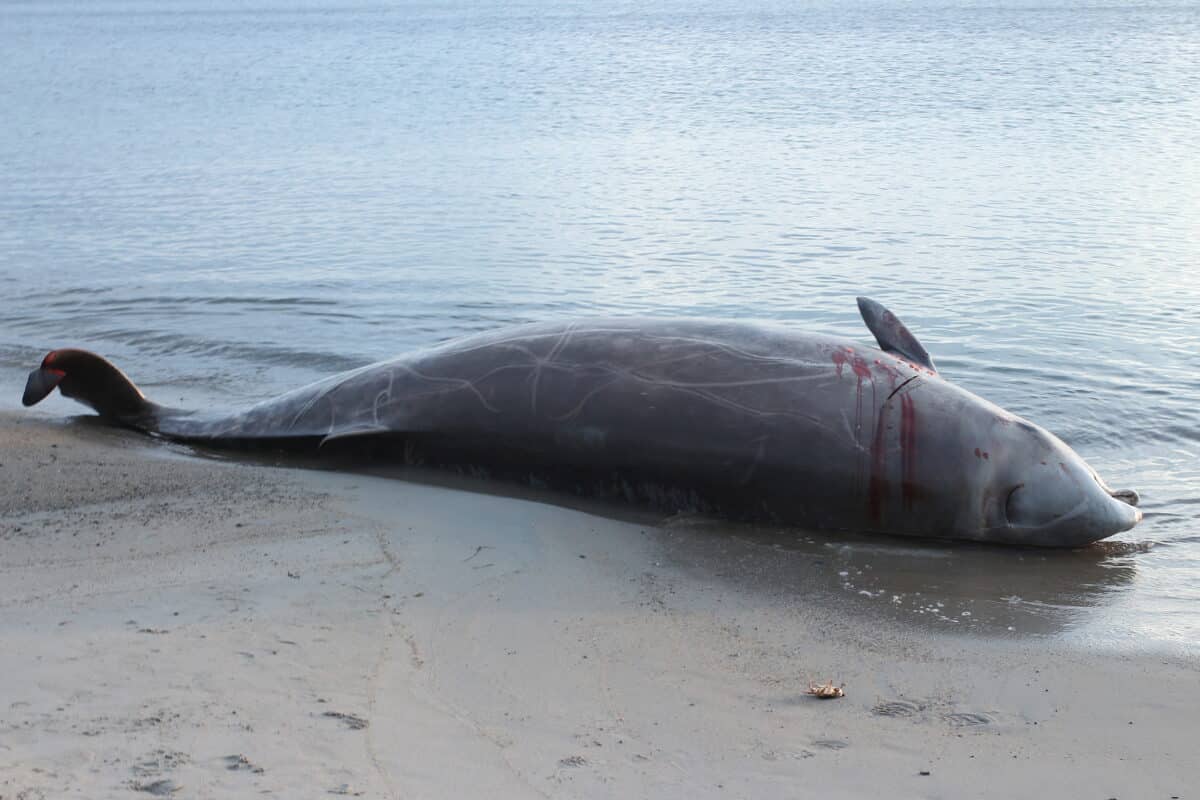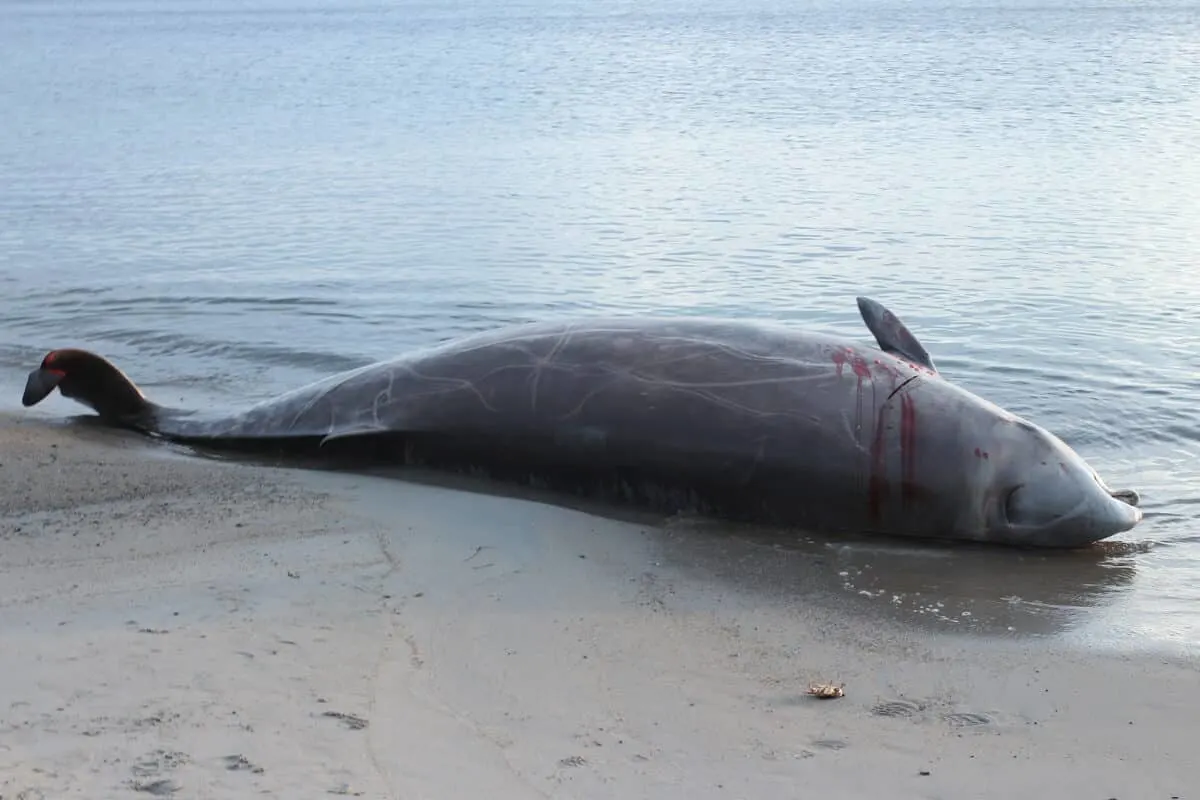An extremely rare Cuvier’s beaked whale was found stranded on the shores of South Africa.

The First Sighting
A group of hikers, consisting of Aaron Stemmett and his students, stumbled upon what they believed to be a Southern right whale calf stranded on Die Plaat beach near Gansbaai, South Africa. Hopeful they could save it, they attempted to push the stranded creature back into the ocean. Concerned about the incoming tide and the safety of his students, Aaron Stemmett swiftly dialed the Marine Dynamics team for assistance.
With a sense of urgency, the dedicated team equipped themselves with nets and buckets to keep the stranded whale wet. Their call also reached the ears of marine conservation partner, Dr. Els Vermeulen from the UP Mammal Research Institute Whale Unit, who immediately set out from a nearby town to join the rescue mission.
The journey to the stranded whale proved to be arduous; the destination not being accessible by road the team had to hike 40 minutes along the beach. Upon arrival, the team was met with a startling revelation.
A Rare Encounter: The Cuvier’s Beaked Whale
Expecting to find a Southern right whale calf, the team was instead faced with a Cuvier’s beaked whale—a species rarely seen in the waters of South Africa. Regrettably, their initial assessment confirmed that the whale had already perished. The marks covering its skin revealed that seabird scavengers had already begun their feast.
The tragedy of the situation was not lost on Wilfred Chivell, CEO of Marine Dynamics and founder of the Dyer Island Conservation Trust. Having traversed the globe to observe, dive with, and photograph various whale species, this was Wilfred’s first encounter with the mysterious Cuvier’s beaked whale. A meeting he had hoped would be a celebration of wonder had transformed into a somber moment.
Improving Our Understanding of The Cuvier’s Beaked Whale
Turning this unfortunate incident into an opportunity for scientific discovery, the team, under the guidance of Ralph Watson, the lead scientist at Marine Dynamics Dyer Island Conservation Trust, diligently gathered measurements and samples for further research. Dr. Vermeulen and her Whale Unit team from the UP Mammal Research Institute furthered the cause by collecting valuable samples from the stranded whale.
The examination revealed that the stranded specimen was an adult female, measuring approximately 5.5 meters in length. Samples were collected from the skin, blubber, and muscle tissue, contributing to our understanding of this elusive species.
The Enigmatic Cuvier’s Beaked Whale

Cuvier’s beaked whales, recognized as one of the most widely dispersed beaked whale species, typically reside in the deep waters of the open ocean, often exceeding depths of 300 meters (1,000 feet). The mysterious nature of these deep-sea dwellers leaves marine biologists with limited knowledge. Thus, strandings like this one provide invaluable opportunities to expand our understanding of these creatures of the deep ocean.
As researchers delve deeper into their study of the Cuvier’s beaked whale, the aim is to uncover more about their behaviors, habits, and the factors that may have led to this particular individual’s death. These findings can contribute to the ongoing conservation efforts to protect these magnificent creatures.
A Bittersweet Twist: Rescuing a Cormorant
While the mission to understand the Cuvier’s beaked whale was underway, the Marine Dynamics team encountered an unexpected twist. A young and undernourished cormorant crossed their path. The team swiftly transported the ailing bird to the African Penguin and Seabird Sanctuary (APSS) for treatment.
Veterinarian Dr. Liezl Pretorius established that the cormorant’s frailty was a direct result of insufficient food. The bird will remain under the care of the APSS until it regains enough weight and strength to return to Die Plaat. This episode serves as a poignant reminder of the interconnectedness of all marine life and the importance of conservation efforts.
Reporting for the Future: Protecting Our Marine Life
The tale of the stranded Cuvier’s beaked whale is a poignant reminder of the mysteries that continue to unravel beneath the waves. While we may not always understand the reasons behind such strandings, these incidents offer us unique insights into the enigmatic world of marine life. It is the dedicated work of organizations like Marine Dynamics and their scientific partners that allow us to shed light on these mysteries and contribute to the ongoing conservation of our oceans.
In the spirit of protecting our marine life, it’s crucial for all of us to remain vigilant. Should you encounter entangled, sick, injured, or stranded marine life in the Gansbaai area and its surroundings, don’t hesitate to contact the Marine Dynamics team at +27 72 598 7117.
What do you think about this Cuvier’s beaked whale stranding? Leave a comment below.
Thank you for following along with this article – Rare Cuvier’s Beaked Whale Washes Ashore in South Africa.
You may also like:
- Why Gray Whales are Washing Up Along the US Coasts
- Lifeguard’s Swift Action Saves Stranded Dolphin
- Australian Authorities Euthanize Stranded Whales After Mass Beaching
- India’s Snow Leopard Survey Reveals 718 Individuals - February 25, 2024
- 10 Interesting Facts About Seahorses - February 24, 2024
- Sea Turtle Nests Discovered in Cambodia - February 24, 2024

